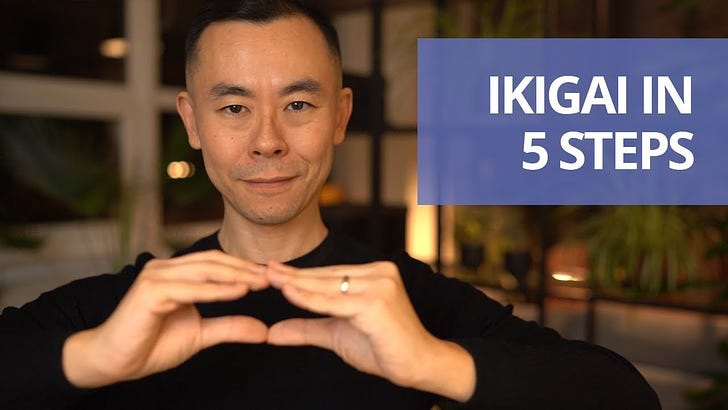Ikigai - Japanese concept about finding your purpose in life & having daily joy in the process of living.
Roughly. / Note, I updated the last post significantly.
Substack is fun for following recommendations by other writers and stumbling across new topics. Today’s find was Your Daily Ikigai, by David Marlow.
A Faster Horse - by David Marlow - Your Daily Ikigai (substack.com)
I looked for more info on the topic as the concept is intriguing.
A couple brief videos on Youtube help fill in the details - finding a purpose in life so that daily life is a joy - that being present in the moment is easy - and which provides value to the world or surrounding community.
This video is inspiring and focused on thought and discussion of the concepts.
From the next video - questions to consider:
What do I love to do? What gets me in the creative zone where meals are missed and I don’t even notice? What do I wake up in the morning excited about getting started on right away?
What am I good at? What do other people ask me for help with?
What can I be paid to do or what have I gotten paid to do in the past?
What does the world need? What does my community or those around me need?
This video is a workbook style guide to spend more time thinking and writing about your own interests and skills and how that might work into a value to your community.
The last video has history and some skepticism about the Venn diagram’s origins and ikigai as ‘an easy answer’ to finding purpose in life. The speaker thinks the Venn diagram is not helpful as it is actually difficult to find overlap - not easy to find someone to pay you. A clip of Ken Mogi, a Japanese who wrote a book on the topic of Ikigai, is included. Ken Mogi does not like the popular Venn diagram. Ikigai is built on five pillars of daily living - they are all Ikigai, not just the overlap. Live in joy, live in a creative zone, live with purpose, live serving others - giving value to the world - and it is all ikigai. Amazon.com: Awakening Your Ikigai: How the Japanese Wake Up to Joy and Purpose Every Day: 9781615194759: Mogi, Ken: Books
He is suggesting the Venn diagram is a Westernized version of the Japanese concept - go back and watch the first video as it doesn’t focus on the pay as much as the daily process of finding joy in daily tasks. If I have to work in a fast-food restaurant to get a paycheck, then I take joy in providing prompt service with good quality food preparation. Yes, it is greasy, smelly, fast-paced and the customers can be cranky. My joy is in doing my work well, whatever my work is.
My flow moments are in writing - finding and sharing information that I think might help other people besides myself. Nutrition and health are my main focus but everything is connected so I dabble in a broad range of topics.
Aside - the ‘creative flow’, ‘being in the zone’, is dissociative and a place of creative insight per many authors and scientists who shared an essay in a book/tribute to Arthur Koestler - a person who wrote both fiction and nonfiction at a high level of skill. See: Books about thinking and non-verbal behavior patterns (substack.com)
Elite families traumatizing their children into DID was a topic of a recent post - the kids who survived may have seemed very skilled in a number of areas of life and able to keep working past normal people’s point of being tired. Being ‘in the zone’ can also elicit an angry response if the person is interrupted and expected to switch gears rapidly to some other topic like “dinner is ready.” And they may react angrily to the abrupt disruption of their concentration.
The recent post that describes DID, formerly known as Multiple Personality Disorder. I didn’t mention it specifically that the background information I was sharing was not from the whistleblower link. It was based on a variety of books that I’ve read, people who I’ve met with DID who were integrated or were not integrated and my own experiences with dissociation. I have had dissociative trauma but my memory blocks weren’t as strong as full DID. I had a recurring nightmare from a toddler trauma event that went away after I had help with EMDR therapy. The toddler perceptions that I had learned included that I didn’t deserve love and did deserve punishment. Sadly, those messages are common among children who experienced early life trauma.
Post with DID info: Human augmentation - super soldiers - conspiracy fact? /Trauma warning/ Illuminati whistleblower & a military book pdf. (substack.com)
Related: Spiritual gardening for the dissociated soul - by Jenny, June 23, 2014, (substack.com) *Post theme is about recovery from sexual trauma but might be of interest for other trauma survivors or those interested in dissociation.
Disclaimer: This information is provided for educational purposes within the guidelines of Fair Use. It is not intended to provide individual guidance. Please seek a health care provider for individualized health care guidance.






Love David's page The Daily Ikigai! Good find
Such a wonderful treat to see this today. Thank you for your kind words Jennifer. 🙏🏻
I agree with Ken Mogi and have had conversations with him on the topic. Ikigai is about experiencing your essence and purpose in harmony with whatever you do.
This 'Venn' (in the link) is more aligned with the deeper meaning of Ikigai which goes well beyond just career.
https://open.substack.com/pub/dailyikigai/p/the-who-what-and-why-of-ikigai?r=1ebps0&utm_campaign=post&utm_medium=web